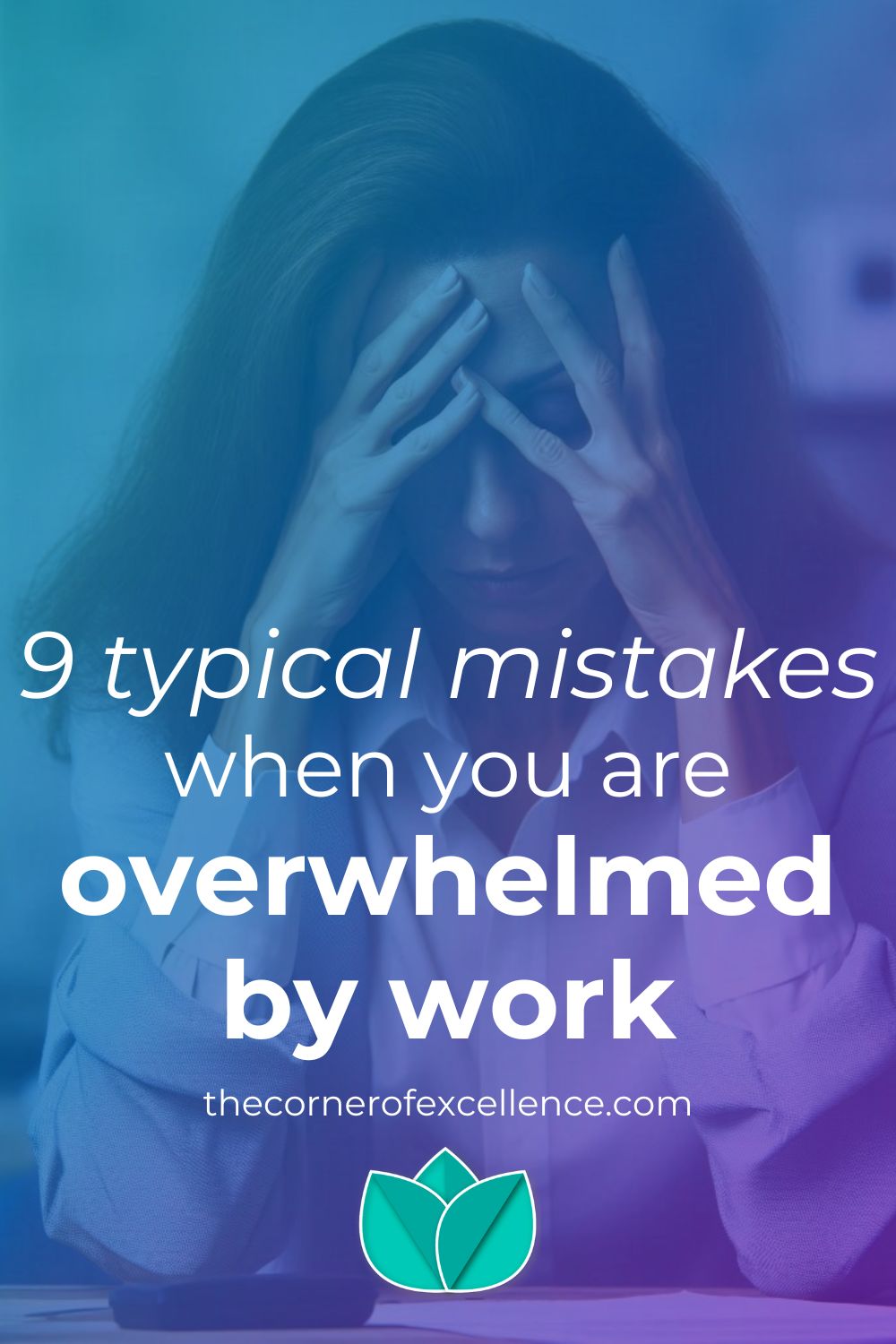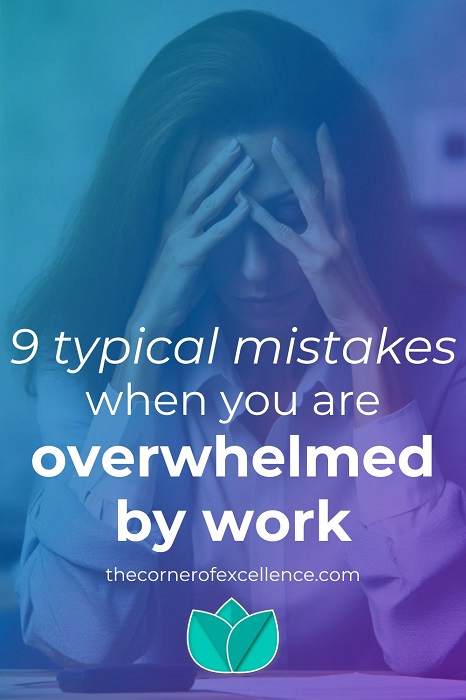
Are you stuck in a hamster wheel of endless tasks? Do you have such a volume of work that you think you don’t have time to improve your situation? This is usually one of the typical signs of work-related stress. Let’s look at some common mistakes we make when we feel overwhelmed and overloaded.
Mistake 1: Work more
Tasks never seem to diminish. In fact, they seem to multiply. That’s why you work harder and harder to reduce the mountain. You may even skip mealtime or work overtime.
I can assure you that I have also gone through phases of work overload. The question is whether you can solve it with the odd extra effort or if the situation perpetuates itself.
What to do
One of my mottos is: work better, not harder. It is good that you have a high work capacity. But the important thing is to ask yourself how you can provide the most value. More on that in the next point. Another thing to assess is whether you carry out the tasks in the most efficient way possible. Do you have systems created for recurring tasks? Are there things you can automate?
Also keep in mind that breaks are key to reducing the feeling of overwhelm and being able to perform better. We are more productive when we allow our brains to unwind from time to time.
Mistake 2: Not stopping to think
Since you are overwhelmed by work and everything you have to do, you don’t stop to reflect. You keep running on your hamster wheel trying to get somewhere. This doesn’t mean you don’t think. Your head may be racing: things to do, worries, ideas, and many other conscious or unconscious thoughts. All of this only adds to your feeling of overwhelm. More about this in mistake 8.
I understand you. When you have a lot to do, it seems counterintuitive to take a halt and it’s hard to take time to think. However, thinking and having ideas is precisely what differentiates us humans from other animals.
What to do
If you are overwhelmed by work, I invite you to ask yourself what exactly is stressing you out. The volume of work? Certain tasks, meetings or conversations? The deadlines? The work hours?
Once you identify the source of your stress, you can make decisions and take actions about it. It could be one of the steps that I mention in this article. If, however, you feel overwhelmed by specific situations, I invite you to delve into what exactly stresses you out. What can you do to get rid of that feeling?
Mistake 3: Not prioritising
Given the large volume of work, you face tasks as they arrive, thus trying to control the situation. But you are so overwhelmed, busy and stuck in your hamster wheel that you don’t take time to assess the real importance and urgency of the issues that arise.
Years ago I realised that I was always going to have more work than time available. I learned that prioritising and focusing on the highest-value tasks was the only reasonable way to be productive.
What to do
Time is limited so it is essential to establish priorities, both at a work and personal level. Consider which are the most important activities and tasks. Think about Pareto’s Law: which 20% of your tasks bring you 80% of the benefits? By benefits I mean that they contribute to your personal, professional and company priorities and goals.
So, of everything you do, what is really important? Which tasks can you postpone? What tasks should you not do yourself but delegate? Which activities or tasks can you eliminate or at least reduce the time you spend on them?
Of the tasks that seem urgent, which ones really are?
Mistake 4: Not planning
How are you going to plan if you don’t even have time to do all the work you have? When we feel overwhelmed by work, it is quite typical to fall into the trap of not taking time for planning. You’re so busy trying to get through the mountain of work that you function in reactive mode. So, you end up in a spiral of unforeseen events and emergencies. Things may catch you by surprise that shouldn’t.
In addition, it will have a hard time moving forward with medium or long-term projects. Because there will always be more urgent tasks before you manage to dedicate time to those subjects that bring longer-term benefits.
The days or weeks that I haven’t taken time to plan haven’t been half as productive as when I do take time to plan. Likewise, having the most important tasks written down saves you a lot of time trying to remember what to do next.
What to do
Realise that working reactively is not effective. Planning helps you align your tasks with your priorities. Writing down tasks also helps you keep a clear mind.
As well, planning allows you to take into account key dates, meetings, presentations and project deadlines. This way you can organise your tasks according to their importance and deadlines. I suggest taking a few minutes each day, week, and month to review your calendar and projects to plan what tasks you should spend your time on.
Mistake 5: Not doing a review
This error is related to the previous one. If you don’t find time to plan because of being overwhelmed, how will you remember to make a review? However, when you don’t take time to review, you lose a great opportunity to learn and thus improve your way of working and your planning. You also lose the opportunity to increase your motivation.
Although I planned, I used to miss a great opportunity by not reflecting regularly on what I had achieved and what I had left pending. We forget achievements too easily. And we repeat the same mistakes if we don’t learn from them. Adding review to my planning routine was a discovery. It increases my pride and satisfaction and with it my motivation. In addition, it has allowed me to learn from mistakes such as unrealistic planning, and thus become increasingly more productive.
What to do
Taking a brief review of our days, weeks and months allows us to see what we have accomplished. In this way we can feel proud of what we have achieved, which will increase our motivation to continue.
It is also interesting to reflect on whether there is any task that took us longer than expected or that we could have done more effectively. I also suggest that you reflect on the tasks that have been left undone. Were you too ambitious in terms of the volume of work you planned to do? Did you lack information or resources? What can you improve in the future?
Mistake 6: Not optimising
When we feel overwhelmed we usually go into autopilot mode. We perpetuate our habits and way of acting and working. If we don’t have time to do all the work, how are we going to stop and think about what we do and how we do it?
In working environments with a high volume of work and tight deadlines, for me, optimising has been a coping mechanism. Always looking for ways to work more effectively, creating systems and automating has helped me be able to get my job done.
What to do
The pace of life and work has accelerated. That is why it is key to consider from time to time whether we can optimise something. I suggest you ask yourself some questions.
Is your routine the most suitable for your type of work? For example, there are jobs where you suffer more interruptions in the mornings and others in the afternoons. Are you trying to do the tasks that require the most concentration right during those hours?
Do you perform routine and recurring tasks in the most efficient way? Have you created work systems or templates so that you don’t build the house from the ground up every time you work on a project or similar tasks?
Do you have a good system for organising yourself that doesn’t make you waste time searching and remembering things? Are you making good use of the applications and tools at your disposal? Are you taking full advantage of all the functionalities of the tools you use?
Mistake 7: Not resting
Possibly one of the biggest mistakes is that we sacrifice moments of rest. Instead of taking a lunch break, you quickly eat a sandwich in front of the computer. In the middle of the afternoon you notice that your concentration is failing. But, since you have so much to do, how are you going to rest for a moment? When you finally leave work you throw to the wind your intention to exercise, practice a hobby or meet a friend.
I think that in this sense mindfulness has helped me gain self-knowledge and self-awareness. I notice more easily if I’m wasting time trying to move forward with an important task even though my ability to concentrate is failing. Then I get up from the chair, walk a little, stretch, or dedicate myself to another task that has nothing to do with it. When I later return to the task at hand, the ideas flow again.
What to do
As I already mentioned point 1, taking time to rest is essential to be more productive. Our brain needs to rest and recover to perform well. This is why a good night’s rest is so important. But that is not enough.
Throughout the day try to take breaks from tasks that require a lot of focus. And your afternoons will be more productive if you take a break of at least half an hour for lunch, and get away from your desk. You won’t rest the same while eating in front of the computer or scrolling through social media. Better eat with friends or read a book. If you can, take a walk, too.
In addition, take short active breaks throughout the day. By that I mean looking away from the screen. Stretch, get up from your chair, look out the window, do some breathing exercises, or talk to a coworker about something unrelated to work.
Mistake 8: Ruminate
‘I have so much work!’ ‘I’m swamped.’ ‘How am I going to finish everything I have pending?!’ ‘How did it occur to me to accept that task with everything on my plate already?’ ‘I’m up to my eyeballs in work and my colleagues there gossiping.’
When you are overwhelmed, does your internal dialogue usually go something like this? Overwhelm, stress and anxiety are often due to three things: Thinking about things that have already happened or that have not yet happened. Or, our expectations about how things should be.
I am also a master at ruminating. My mind doesn’t stand still. The problem is when it is not for useful things like having ideas.
What to do
Both worrying about things that could happen in the future (or not) and ruminating about the past are usually futile. I’m not saying it couldn’t be useful. But most of the time we do it without rhyme or reason. We simply let our thoughts take control. And that usually doesn’t solve anything, but it does increase our feeling of overwhelm.
So bring your mind to the present moment. Pay attention to your body and your breathing for a moment. If necessary, write down pending tasks that have come to mind. Then focus completely on the task in front of you.
Instead of letting your mind ruminate whenever it wants, take advantage of the moments of planning and review to think constructively about how not to repeat mistakes and what to improve.
Mistake 9: Not being assertive
When we are overwhelmed and overloaded, a lack of assertive communication often comes into play. We are overloading ourselves because we do not dare to admit and say that we cannot take on more. We may have a hard time setting limits, either for ourselves or for others. We don’t want to disappoint, appear weak or incompetent.
But as I mentioned above, it is common for the volume of work to exceed the time available. That is why it is so important to prioritise on the one hand and set limits on the other. This requires daring to admit and communicate our situation, as well as seeking and proposing solutions.
What to do
First become aware of when or why it is difficult for you to set limits. What emotions and desires are hidden behind it? Fear of not being liked, of failing, of not appearing competent…? Fears can lead us to self-sabotaging behaviours such as hyper-demand or complacency. Once you have identified it, what is the worst that could happen if you admit your situation and share it, for example, with your boss? And what’s the best that could happen?
Secondly, I suggest that you train your assertiveness. It means expressing your needs, desires and opinions respectfully on the one hand. On the other hand, it requires respecting the wishes, needs and opinions of others. Think about the people around you. Which ones do you respect the most? Those who always say yes to everything, even at the risk of not keeping their promise? Or people who are clear about their priorities and what they want and express it? I’m going to venture that you agree that you respect the latter more. So which category would you like to be in yourself?
What mistakes do you make when you are overwhelmed?
Which of the mentioned traps do you fall into when you feel swamped? Which of the tips and tricks are you going to try?
If you need help to get rid of feeling overwhelmed by work, do not hesitate to contact me to find out how I can help you.

Sharing is caring!




